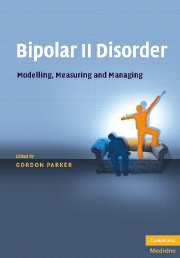Book contents
- Frontmatter
- Contents
- List of contributors
- Preface
- Introduction
- 1 Bipolar disorder in historical perspective
- 2 The bipolar spectrum
- 3 Defining and measuring Bipolar II Disorder
- 4 Bipolar II Disorder in context: epidemiology, disability and economic burden
- 5 Is Bipolar II Disorder increasing in prevalence?
- 6 The neurobiology of Bipolar II Disorder
- 7 The role of antidepressants in managing Bipolar II Disorder
- 8 The use of SSRIs as mood stabilisers for Bipolar II Disorder
- 9 Mood stabilisers in the treatment of Bipolar II Disorder
- 10 The use of atypical antipsychotic drugs in Bipolar II Disorder
- 11 The role of fish oil in managing Bipolar II Disorder
- 12 The role of psychological interventions in managing Bipolar II Disorder
- 13 The role of wellbeing plans in managing Bipolar II Disorder
- 14 Survival strategies for managing and prospering with Bipolar II Disorder
- 15 A clinical model for managing Bipolar II Disorder
- 16 Management commentary
- 17 Management commentary
- 18 Management commentary
- 19 Management commentary
- 20 Management commentary
- 21 Management commentary
- 22 Management commentary
- 23 Management commentary
- 24 Management commentary
- 25 Management commentary
- 26 Management commentary: What would Hippocrates do?
- 27 Management commentary
- 28 Rounding up and tying down
- Appendix 1 Black Dog Institute Self-test for Bipolar Disorder: The Mood Swings Questionnaire
- Index
- References
8 - The use of SSRIs as mood stabilisers for Bipolar II Disorder
Published online by Cambridge University Press: 13 August 2009
- Frontmatter
- Contents
- List of contributors
- Preface
- Introduction
- 1 Bipolar disorder in historical perspective
- 2 The bipolar spectrum
- 3 Defining and measuring Bipolar II Disorder
- 4 Bipolar II Disorder in context: epidemiology, disability and economic burden
- 5 Is Bipolar II Disorder increasing in prevalence?
- 6 The neurobiology of Bipolar II Disorder
- 7 The role of antidepressants in managing Bipolar II Disorder
- 8 The use of SSRIs as mood stabilisers for Bipolar II Disorder
- 9 Mood stabilisers in the treatment of Bipolar II Disorder
- 10 The use of atypical antipsychotic drugs in Bipolar II Disorder
- 11 The role of fish oil in managing Bipolar II Disorder
- 12 The role of psychological interventions in managing Bipolar II Disorder
- 13 The role of wellbeing plans in managing Bipolar II Disorder
- 14 Survival strategies for managing and prospering with Bipolar II Disorder
- 15 A clinical model for managing Bipolar II Disorder
- 16 Management commentary
- 17 Management commentary
- 18 Management commentary
- 19 Management commentary
- 20 Management commentary
- 21 Management commentary
- 22 Management commentary
- 23 Management commentary
- 24 Management commentary
- 25 Management commentary
- 26 Management commentary: What would Hippocrates do?
- 27 Management commentary
- 28 Rounding up and tying down
- Appendix 1 Black Dog Institute Self-test for Bipolar Disorder: The Mood Swings Questionnaire
- Index
- References
Summary
Introduction
The general role of antidepressants in managing depression in those with bipolar disorder (‘bipolar depression’) attracts views and management strategies that are poles apart, as detailed by Goldberg in Chapter 7 and debated closely in the commentaries published in this book. The ‘bipolar’ positioning of expert opinion on this topic can be briefly illustrated.
While the British Association of Psychopharmacology (Goodwin, 2003) guidelines note that antidepressants ‘are effective for treating depression in bipolar disorder’ (p. 162), such guidelines – as for all others written for bipolar disorder – explicitly or implicitly refer to the management of Bipolar I Disorder (BP I). Nevertheless, there are substantive concerns about using antidepressants alone in managing episodes of bipolar depression. Essentially, most formal treatment guidelines argue against using antidepressants as monotherapy in bipolar patients – due to concerns about antidepressant drugs inducing switching and rapid cycling. In Chapter 7, Goldberg also notes some data arguing against any effectiveness of antidepressants as combination therapies (with mood stabilisers). In terms of what might be considered as the current representative view, Gijsman et al. (2004) informed us that all major reviews and guidelines for managing bipolar depression over the past decade have instead recommended that a mood stabiliser should be prescribed alone or before prescribing (after a significant interval) any antidepressant drug, to prevent risks of switching and rapid cycling.
- Type
- Chapter
- Information
- Bipolar II DisorderModelling, Measuring and Managing, pp. 107 - 119Publisher: Cambridge University PressPrint publication year: 2008
References
- 1
- Cited by



